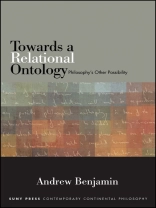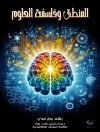An original philosophical account of relational ontology drawing on the work of Descartes, Kant, Fichte, Hegel, and Heidegger.
In this original work of philosophy, Andrew Benjamin calls for a new understanding of relationality, one inaugurating a philosophical mode of thought that takes relations among people and events as primary, over and above conceptions of simple particularity or abstraction. Drawing on the work of Descartes, Kant, Fichte, Hegel, and Heidegger, Benjamin shows that a relational ontology has always been at work within the history of philosophy even though philosophy has been reluctant to affirm its presence. Arguing for what he calls anoriginal relationality, he demonstrates that the already present status of a relational ontology is philosophy’s other possibility. Touching on a range of topics including community, human-animal relations, and intimacy, Benjamin’s thoughtful and penetrating distillation of ancient, modern, and twentieth-century philosophical ideas, and his judicious attention to art and literature make this book a model for original philosophical thinking and writing.
Spis treści
1. Being-in-Relation
2. Recovering Relationality: Contra Heidegger’s Descartes
3. Relationality and the Affective Structure of Subjectivity: Kant’s 'An Answer to the Question: What is Enlightenment?’
4. Democracy, Relationality, and the University: Fichte’s 'Some Lectures concerning the Scholar’s Vocation’
5. Justice, Love, and Relationality: The Figure of Niobe in Hegel’s Lectures on Fine Art
6. Anonymity and Fear: The Refusal of Relationality in Hegel’s Philosophy of Right
7. Animal Relations: Modes of Presence in Kant’s Critique of Practical Reason
8. Obdurate Love: Intimate Relations: Toward a Metaphysics of Intimacy
Conclusion: Opening Relations
Bibliography
Index
O autorze
Andrew Benjamin is Professor of Philosophy and Jewish Thought at Monash University, Australia and Distinguished Professor of Philosophy and Humanities at Kingston University, London. He is the author of Towards a Relational Ontology: Philosophy’s Other Possibility and the coeditor (with Dimitris Vardoulakis) of Sparks Will Fly: Benjamin and Heidegger, both also published by SUNY Press.












